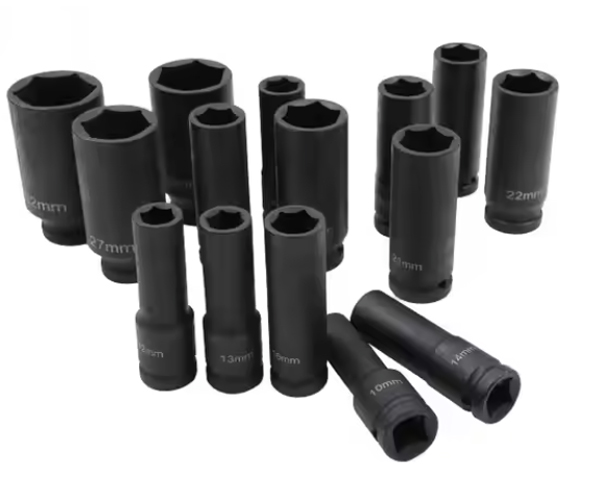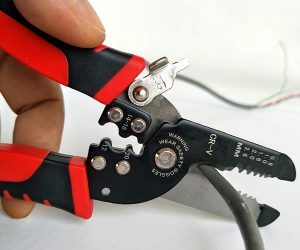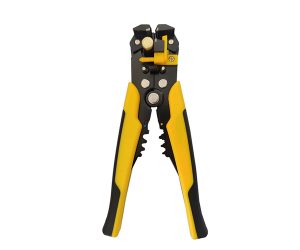Introduction
If you’re using an air impact wrench, you might be wondering, “What type of socket should I use with my air impact wrench?” The socket is crucial for achieving the right fit and performance, ensuring that your tool works efficiently and safely. Using the wrong socket can cause significant damage to both the tool and the fastener you’re working on, costing time and money. This post will guide you through the different socket types, their features, and how to choose the perfect one for your air impact wrench.
What is an Air Impact Wrench and How Does It Work?
An air impact wrench, also known as a pneumatic impact wrench, is a powerful tool commonly used in industries like automotive repair, construction, and manufacturing. It uses compressed air to deliver high-torque output, making it ideal for tasks like loosening stubborn bolts or lug nuts. The wrench’s powerful rotational force comes from its internal mechanism, which is powered by a compressed air source. This tool typically provides a more substantial force than manual wrenches, allowing workers to complete tasks more efficiently.
In addition to its speed and power, the air impact wrench is known for its versatility. It can handle a wide range of fastener sizes and materials, which makes it indispensable for automotive technicians, industrial mechanics, and DIY enthusiasts. The air impact wrench, however, is not complete without the proper socket. The socket acts as the connector between the wrench and the fastener, and it plays a pivotal role in the effectiveness of the tool. Choosing the right socket ensures a secure fit, efficient torque transfer, and long-lasting performance for both the tool and the fasteners.
The crucial factor when selecting a socket is understanding how the impact wrench works, and why its characteristics demand specific socket types. The torque produced by an air impact wrench can be intense, meaning that standard sockets, which are designed for manual tools, might not be able to withstand this force. This brings us to the importance of impact sockets—designed specifically to handle the stress exerted by air impact wrenches.
The Importance of Using the Correct Socket with an Air Impact Wrench
When working with an air impact wrench, choosing the right socket is a game-changer. Using the wrong socket can lead to multiple issues, including tool damage, unsafe working conditions, and poor job performance. Here’s the deal: impact wrenches produce immense torque that can crack or warp weaker sockets, especially those not made for high-impact use. Not only will using the wrong socket compromise the tool’s efficiency, but it can also damage your fasteners or cause safety hazards.
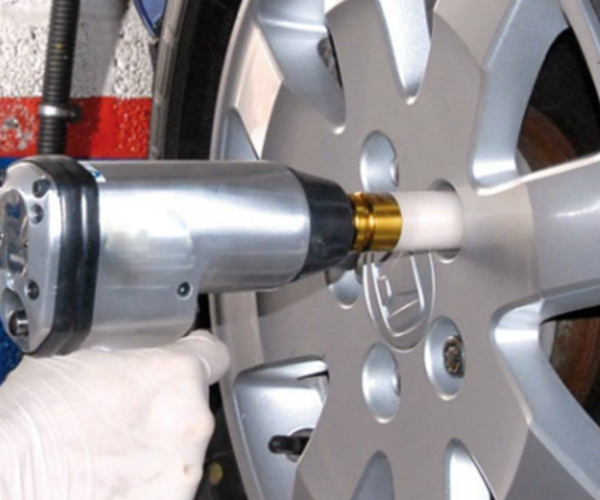
Incorrect socket usage can lead to stripped bolts, damaged threads, and even injuries. You might be wondering why impact sockets are necessary in the first place. The difference lies in the socket’s construction. Impact sockets are thicker, made from stronger materials, and designed to absorb high levels of force. They are built to last longer under stress, whereas regular sockets can crack or break under the pressure of an air impact wrench.
Moreover, you don’t want to risk damaging your expensive tools. By choosing the correct socket, you ensure that the wrench’s power is delivered efficiently, protecting both the tool and your project. This section will dive deeper into why this decision is critical and how the wrong socket can lead to costly repairs and lost time.
Types of Sockets: Standard vs. Impact Sockets
When it comes to choosing the right socket for your air impact wrench, understanding the difference between standard and impact sockets is crucial. Here’s the deal: while both types serve the same basic function, they’re not interchangeable when working with high-torque tools like impact wrenches. The primary difference lies in the material and design.
Standard sockets are typically made from chrome vanadium (Cr-V), which is durable enough for manual torque applications but not suitable for the high-impact forces generated by an air impact wrench. These sockets are usually thinner and can crack under pressure. On the other hand, impact sockets are made from stronger materials like chrome molybdenum (Cr-Mo), which can handle the shock loads produced by an impact wrench. They’re also thicker and designed to absorb and dissipate the force that would otherwise damage a standard socket.
You might be wondering, “Why can’t I just use my standard sockets?” The short answer is that you can, but you shouldn’t. Standard sockets are not built to withstand the repetitive high-torque forces that air impact wrenches generate. This can lead to premature wear, broken sockets, or even tool malfunction. Choosing an impact socket ensures that your air impact wrench works at its peak performance, while also protecting your tools and fasteners.
In terms of functionality, impact sockets often have a slightly different design than standard sockets, with a larger drive hole and deeper, more reinforced walls. This added thickness and durability make them far more suitable for impact wrench applications, where force absorption and strength are necessary to get the job done efficiently.
What Makes Impact Sockets Special?
Impact sockets are specifically engineered to handle the extreme forces created by air impact wrenches. These specialized tools are built with a few distinct features that set them apart from regular sockets. The main difference lies in the materials and design modifications that make them more resistant to impact stress.
Impact sockets are primarily made from chrome molybdenum (Cr-Mo) steel, which is much tougher than the chrome vanadium (Cr-V) typically used in standard sockets. This material allows the socket to withstand the repeated shock and torque created by an air impact wrench without cracking or warping. The thicker walls of impact sockets are designed to absorb and dissipate the immense forces produced by the tool, ensuring they last longer and perform better under heavy use.
Here’s the deal: the reason these sockets are essential for air impact wrenches is that they allow for the efficient transfer of torque without compromising the strength of the tool. Impact sockets typically feature a more substantial drive end, as well as a more durable coating to resist wear and corrosion. These features allow impact sockets to maintain their integrity even after extended use, while regular sockets may bend, crack, or break when used with power tools.
In addition to their construction, impact sockets often come with specific design features that help enhance their performance. For example, they may have a thicker wall construction that provides extra strength and prevents the socket from shattering when subjected to impact forces. This makes them a better choice for high-torque tasks, such as removing lug nuts or working on large machinery.
Choosing the Right Size Socket for Your Air Impact Wrench
Choosing the correct size socket is essential when using an air impact wrench, as it ensures a secure fit and helps the tool perform efficiently. Socket sizes are typically measured in either metric or imperial (SAE) units, and selecting the right size ensures that the fastener is properly engaged and can be tightened or loosened without issues.
The next thing you need to know is that socket sizes are not one-size-fits-all. Each air impact wrench will have a specific range of sizes that are compatible with the tool’s drive size. For example, a 3/8-inch impact wrench will use sockets designed for a 3/8-inch drive. Matching the right socket size to the bolt or fastener size is crucial for efficient work and tool longevity.
Socket size charts are available for reference, listing the corresponding socket sizes for various bolt and nut sizes. By using these charts, you can easily determine which socket fits your specific application. Using a socket that is too large or too small can result in poor torque transfer, and in the worst case, damage to both the socket and the fastener.
Common Socket Sizes include 8mm to 19mm for automotive applications and 1/2-inch or 3/8-inch drive sizes for industrial uses. You can often find socket sets that come with a variety of sizes, allowing you to tackle different types of projects with ease.
The Role of Socket Drive Size in Air Impact Wrench Compatibility
One critical factor to consider when choosing a socket for your air impact wrench is the socket drive size. Drive size is the part of the socket that connects to the tool, and it is critical to match the correct drive size with your impact wrench. Impact wrenches come in various drive sizes, including 1/4-inch, 3/8-inch, 1/2-inch, and 3/4-inch, and each size is designed for specific types of applications.
A 1/4-inch drive is commonly used for lighter tasks, such as smaller bolts or screws, while 1/2-inch and 3/4-inch drives are designed for heavy-duty applications, such as lug nuts or industrial equipment. Here’s the deal: choosing the wrong drive size for your air impact wrench can lead to improper torque delivery or even tool damage.
For example, using a socket with too large of a drive for your wrench could cause excessive torque, damaging both the fastener and the tool. On the other hand, a drive size that is too small may lead to ineffective torque transfer and make the job more difficult. By selecting the appropriate socket drive size, you ensure the tool functions at its peak, delivering optimal results while minimizing wear and tear.
When purchasing sockets for an impact wrench, always check the compatibility of the drive size, as this will affect not only the performance but also the safety of your project.
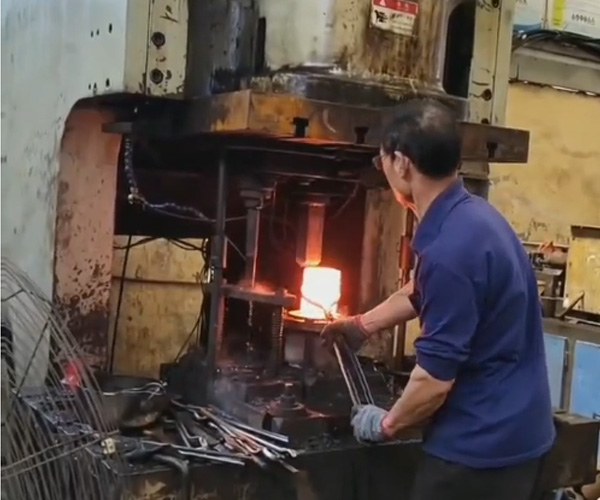
FAQ
What type of socket should I use with a 1/2-inch air impact wrench?
For a 1/2-inch air impact wrench, you should use 1/2-inch drive impact sockets. These sockets are specifically designed to withstand the high torque generated by the impact wrench, ensuring a secure fit and efficient performance. Make sure to choose impact sockets made from durable materials like chrome molybdenum (Cr-Mo) to handle the intense forces produced by the tool.
Can I use chrome sockets with an air impact wrench?
While chrome sockets may fit your air impact wrench, they are not designed to handle the high-impact forces generated by the tool. Chrome sockets are made for hand tools, where lower torque levels are used. Impact sockets, made from stronger materials like chrome molybdenum (Cr-Mo), are recommended for air impact wrenches as they are specifically designed to withstand shock loads and prevent cracking or breaking under pressure.
What’s the difference between a 6-point and a 12-point impact socket?
A 6-point impact socket has six sides that grip fasteners, while a 12-point impact socket has twelve sides. The 6-point socket provides a more secure grip and is less likely to slip off during use, making it a better choice for high-torque applications. 12-point sockets are easier to engage on fasteners at awkward angles but may not provide as much grip as 6-point sockets, especially in high-torque situations.
Are there any advantages to using a deep socket with my air impact wrench?
Yes, deep sockets are especially useful when working with fasteners that are recessed or require a longer reach. They provide extra depth to access bolts in tight spaces, making them ideal for tasks like automotive repairs or machinery maintenance. However, for more shallow or easily accessible fasteners, shallow sockets would be more efficient.
Why does my impact wrench keep slipping off the socket?
If your impact wrench keeps slipping off the socket, it could be due to several factors. First, ensure you’re using the correct socket size for the fastener. Worn-out or damaged sockets could also lead to poor engagement. In some cases, using the wrong drive size or a socket that isn’t designed for impact wrenches might be causing the issue. Be sure to choose impact sockets that fit securely and are made to handle high torque forces.
How do I know if my socket is worn out and needs replacing?
You can tell if your socket is worn out by checking for visible signs of damage, such as cracks, chips, or significant wear around the edges. If the socket no longer fits snugly onto fasteners, or if it slips or deforms during use, it’s time to replace it. Worn-out sockets can lead to poor performance and potentially cause damage to your air impact wrench or fasteners.
Can I use deep sockets with any air impact wrench?
Yes, you can use deep sockets with any air impact wrench as long as they are the correct size and drive type. Deep sockets are generally used when extra depth is needed to reach fasteners in deep recesses, making them ideal for certain automotive, mechanical, or industrial applications. Be sure to select deep impact sockets designed for use with high-torque tools like air impact wrenches.
Call to Action
If you’re in need of high-quality, durable impact sockets and want to create your own brand, we’re here to help! As an experienced OEM impact socket factory, we specialize in providing customized socket solutions tailored to your specific requirements. Whether you’re looking to expand your product line or create a unique brand identity, we can help you every step of the way.
Contact us today to discuss your OEM needs and discover how we can collaborate to bring your brand vision to life. With our expertise, cutting-edge manufacturing processes, and commitment to quality, we’ll ensure your impact sockets meet the highest standards and exceed customer expectations.
Let’s create something great together — reach out now and take the first step towards launching your own line of impact sockets!

